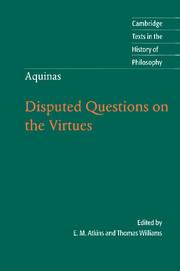Book contents
- Frontmatter
- Contents
- Preface
- Introduction
- Chronology
- Further reading
- Translator's note on the text
- List of abbreviations
- Disputed Questions on the Virtues
- On the Virtues in General: thirteen articles
- On Charity: thirteen articles
- On Brotherly Correction: two articles
- On Hope: four articles
- On the Cardinal Virtues: four articles
- Terminology
- Glossary
- Table of parallel questions
- Index of scriptural citations
- Index of non-scriptural citations
- Index of names and subjects
- CAMBRIDGE TEXTS IN THE HISTORY OF PHILOSOPHY
On Hope: four articles
Published online by Cambridge University Press: 05 June 2012
- Frontmatter
- Contents
- Preface
- Introduction
- Chronology
- Further reading
- Translator's note on the text
- List of abbreviations
- Disputed Questions on the Virtues
- On the Virtues in General: thirteen articles
- On Charity: thirteen articles
- On Brotherly Correction: two articles
- On Hope: four articles
- On the Cardinal Virtues: four articles
- Terminology
- Glossary
- Table of parallel questions
- Index of scriptural citations
- Index of non-scriptural citations
- Index of names and subjects
- CAMBRIDGE TEXTS IN THE HISTORY OF PHILOSOPHY
Summary
The first question is whether hope is a virtue.
The second is whether hope is found in the will as its possessor.
The third is whether hope is prior to charity.
The fourth is whether only those on the journey possess hope.
Article 1: Whether hope is a virtue
Objections
It seems not, because:
(1) Virtue does not relate to both what is good and what is bad, but only to what is good. That is why Augustine says [FC 2.18, 19] that no one uses a virtue in a bad way. But hope is related to both good and bad, as some people have good hopes and some have bad hopes. Therefore hope is not a virtue.
(2) God works virtue in us without us, as I have already said. From this it is clear that virtues precede, and do not result from, merit. But hope is a result of merit, because it means ‘a confident expectation of future blessedness that flows from grace and merit’, as Peter Lombard says [Sent 3.26.1]. Therefore hope is not a virtue.
(3) Rejoinder: hope does not presuppose meritorious activity, but only a meritorious disposition. But on the other hand the disposition that is the basis of merit is charity. Now hope precedes charity rather than presupposing it. For the gloss says on Matthew 1 that hope produces charity. Therefore even the disposition of hope does not presuppose merit.
(4) Virtue is a tendency of something perfect, according to Aristotle [Phys 7.3, 246b2]. On that basis, he proves elsewhere [NE 4.9.1, 1128b10] that shame is not a virtue, because it affects those who are imperfect. But hope is also a tendency of those who are less than perfect, because they are still separated from what is good. Therefore hope is not a virtue.
- Type
- Chapter
- Information
- Thomas Aquinas: Disputed Questions on the Virtues , pp. 217 - 240Publisher: Cambridge University PressPrint publication year: 2005



